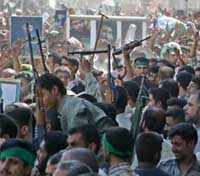|
Iraqi National Conference Begins, Group Walks Out
 |
|
"The movements that boycott this conference are free to do that," Maasum said
|
BAGHDAD
, August 15 (IslamOnline.net & News Agencies) – Amid worrying news
about the resumption of fighting in Najaf between US-backed Iraqi
forces, loyal to the interim government, and Mehdi Army fighters, loyal
to young Shiite leader Moqtada Al-Sadr, a large group of participants
walked out of the much-anticipated Iraqi national conference which
opened in
Baghdad
Sunday, August 15.
More
than 100 people leapt out of their seats as soon as UN special envoy to
Iraq, Ashraf Jehangir Qazi, finished his opening speech, shouting
"as long as there are air strikes and shelling we can't have a
conference", according to Agence France-Presse (AFP).
Yahya
Mussawi, a representative of a group known as the Shiite House, which
worked to defuse a spring uprising by Sadr, jumped on to the podium
before he was forced down by chief organizer Fuad Maasum.
"Part
of democracy is that you listen to the Iraqi people. It is time that you
heard us and we ask that military operations stop in Najaf immediately
and dialogue takes place," he shouted.
"Listen
to us, Prime Minister, listen to us," said the protestors, as
Maasum announced that there would be a 30-minute break in the
proceedings.
The
dramatic events in the opening of the conference, long marketed by the
Americans as an experiment in post-Saddam Hussein democracy, took place
as news of fighting in Najaf being resumed reached the conference hall
in
Baghdad
.
According
to AFP, gunfire boomed across Najaf Sunday, one day after the interim
government said its offensive against Shiite Muslim militiamen would
continue after peace talks failed.
An
AFP correspondent heard tank fire and saw smoke rising from the
direction of the cemetery, north of the holy shrine of Imam Ali, which
has remained a militia stronghold since a spring uprising against
foreign troops.
Tight
Security
 |
|
Thousands of Iraqis arrived in Najaf to protect the sacred shrines
|
After
being put off from its original date July 31, to give the chance for
Iraqi currents and political powers to take part, the national
conference opened Sunday amid tight security, with many powers still
absent and voicing their own concerns.
Blocked
roads, concrete barricades, tanks and sniffer dogs greeted the
participants arriving at the convention center inside the fortified
Green Zone which houses the seat of the interim government and the
US
embassy.
Two
main roads leading to the venue were blocked with police cars. US
helicopters criss-crossed the skies of
Baghdad
from the early hours and the Al-Jumhuriya (republic) bridge spanning the
Tigris
river was shut.
An
8:00 am (0400 GMT) to 4:00 pm (1200 GMT) curfew has been slapped on the
adjacent old Karkh and Sheikh Marouf neighborhoods, known trouble spots
of recent clashes between US-backed police and Iraqis rejecting the
presence of foreign troops.
Just
minutes after the conference opened, at least five explosions rang out
across the capital.
Both
Shiites loyal to Sadr and the influential Sunni Association of Muslim
Scholar shave announced their decision to boycott the event, dismissing
it as unrepresentative of the true will of Iraqis.
"The
movements that boycott this conference are free to do that, but that
doesn't cause the conference to lose its legitimacy," Maasum has
said Saturday.
Despite
large factions being absent, clashes taking place all across
Iraq
and doubts by observers on results to come out of it, Maasum put in a
hopeful note, during his inauguration speech.
"We
are laying the first building blocks for our country's march towards
democracy and ridding ourselves of the 35-year legacy of the previous
regime."
The
conference will first hold working sessions to discuss the transition
process, human rights, reconstruction and the issue of justice for those
who suffered under Saddam's former dictatorship.
On
the last day, delegates will select 81 members of a national council to
advise the interim government as it paves the way for national elections
in January 2005.
The
other 19 seats have already been allocated to members of the defunct
US-picked interim Governing Council that served between Saddam's fall
and the creation of the caretaker government in early June.
|